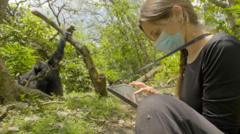In the rolling hills of southwest Virginia, a movement is blossoming that fuses agriculture with cultural heritage, led by local farmers and educators aiming to rejuvenate the herbal economy. Central to this initiative are individuals like Dr. Ryan Huish, a biology professor at the University of Virginia’s College at Wise, who invites students to explore the lush forests near Duffield. On a sunny April afternoon, they discover a range of edible plants, from the garlicky ramps to the unique Appalachian wasabi, fostering a deeper connection with their local environment.
For generations, Appalachian communities have relied on wild plants not merely for sustenance, but also as a source of traditional medicine. However, the market around these invaluable botanicals has faced challenges, including poor regulation, which has resulted in diminishing returns for local harvesters and raised concerns about overharvesting practices. As Katie Commender, director of the Appalachian Harvest Herb Hub, notes, "Tradition is dying out and not necessarily being passed on to the next generation." In response, farmers are now banding together to form local solutions that promise a more sustainable approach to herbal farming that honors the region’s history.
This grassroots effort aims to create a profitable herbal industry while ensuring research and education about these time-honored practices thrive. As part of the "50 States, 50 Fixes" series, the dedication of Virginians to restore and evolve their forest economy illustrates a powerful response to environmental sustainability challenges. Moving forward, they endeavor to not only keep traditions alive but also cultivate them for future generations.





















